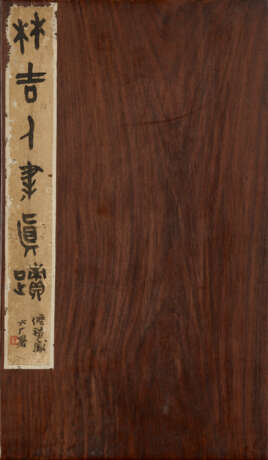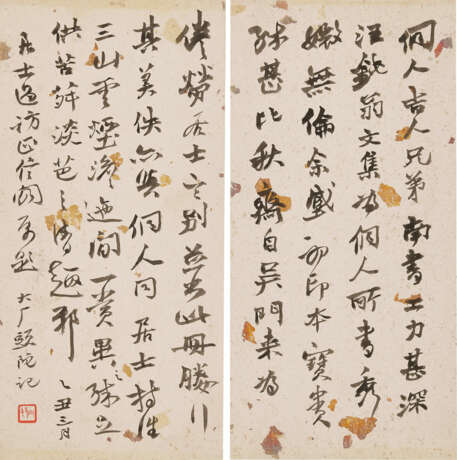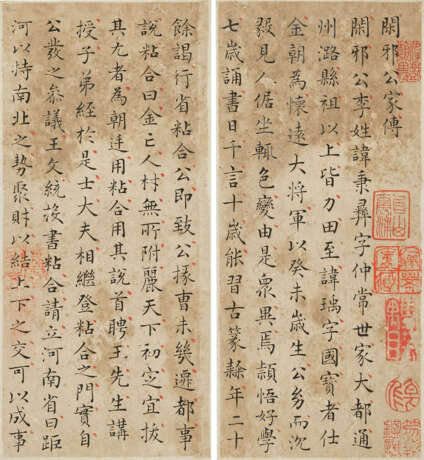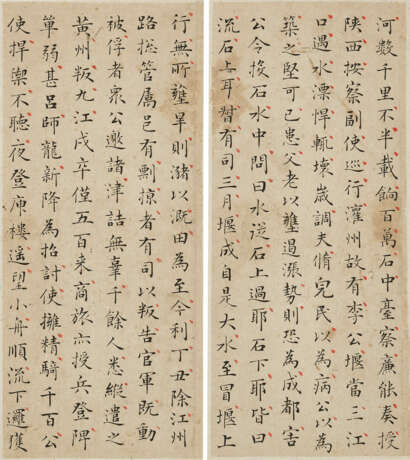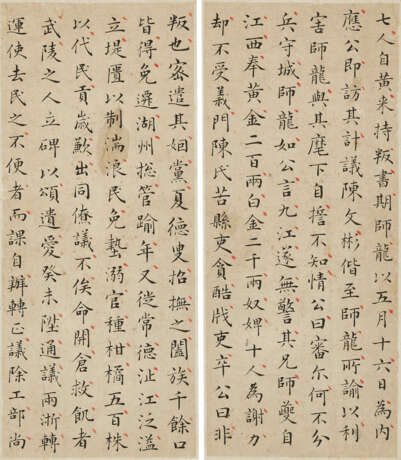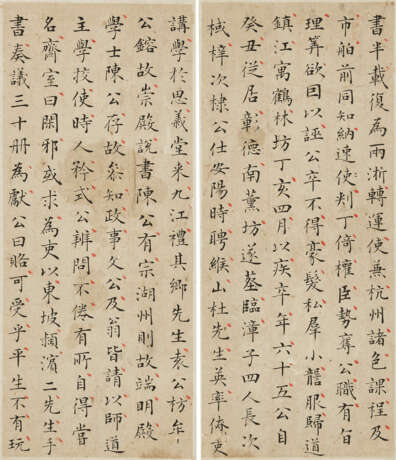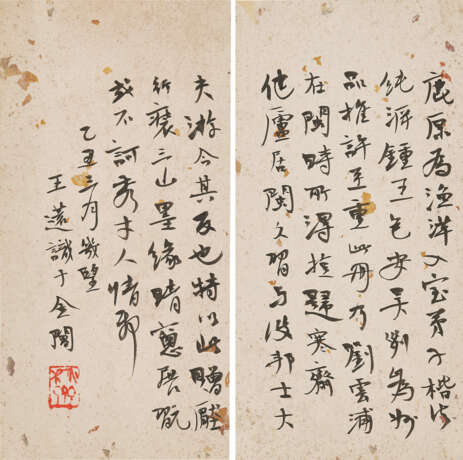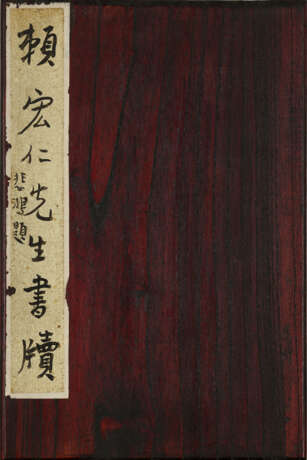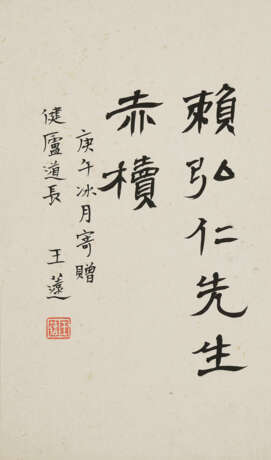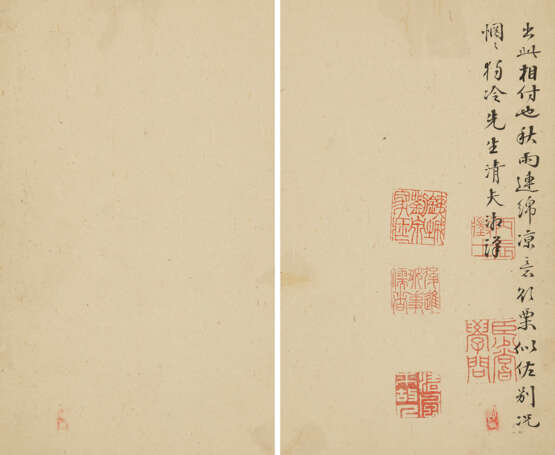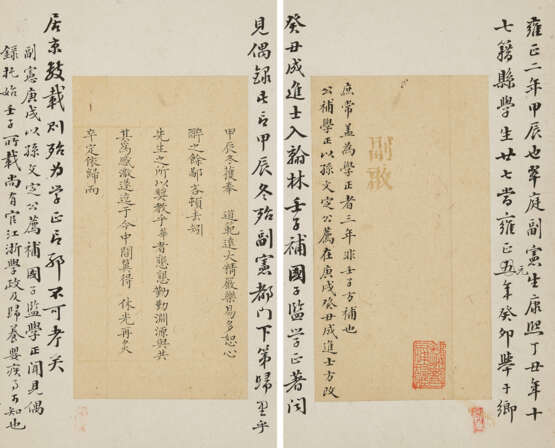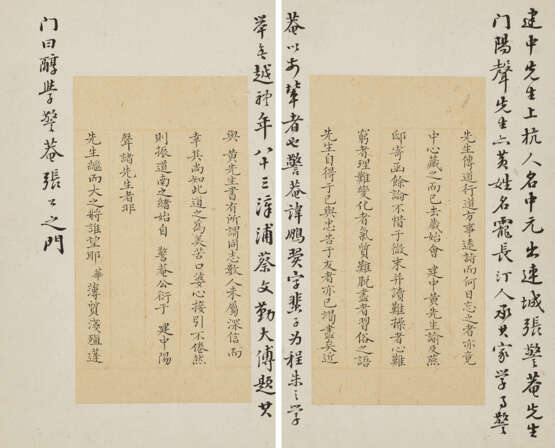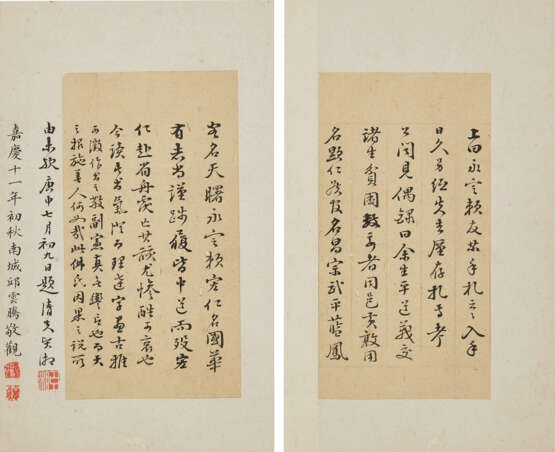ID 807230
Los 151 | LIN JI (1660-1723) / LAI HONGREN (17TH-18TH CENTURY)
Schätzwert
HKD 30 000 – 50 000
Calligraphy in Regular Script / Handwritten Letter to Mr. Lei Hong from Lai Hongren
Calligraphy in Regular Script
Album of six double leaves, ink on paper
Each leaf measures 23 x 10.5 cm. (9 x 4 1/8 in.)
Entitled and signed, with two seals of the artist
Nine collectors’ seals, including three of Cheng Kinlo (1892-1980), one of Wu Pingzhai (1811-1883)
Colophons by Yi Da’an (1874-1941) and Wang Qiumei (1884-1944), with a total of two seals
Titleslip inscribed and signed by Yi Da’an, with one seal
NOTE:
Lin Ji (1660-1723), who styled himself as Jiren, Luyuan, and given Pu Xuezhai, was a native of Fuzhou, Fujian. During the reign of Emperor Kangxi, he was an imperial scholar and served as a cabinet secretariat. Lin is an expert in calligraphy, especially regular script. He learned to write articles from Wang Wan and poems from Chen Tingjing and Wang Shizhen. He authored renowned books Park Xuezhai Poetry Collection and Park Xuezhai Notes.
Yi Da’an, who styled himself as Tingxi, Jifu, later known as Yi Mingru, was a native of Heshan, Guangdong province, a seal carver and a music educator. He began his higher education at Guangya College, transferred to Shanghai Aurora University, and later continued his studies in Japan. Yi was a polymath who was fluent in English, French, and Japanese, well versed in ancient texts and poetry, and accomplished in painting, calligraphy, as well as engraving. Upon returning to China, he taught at many institutions, including the Shanghai Conservatory, Jinan University, and Beijing Normal University. Together with Huang Binhong, they established the South China Printing Society and the Jinshi Painting and Calligraphy Society to promote acclaimed works to the public.
Wang Yan is a literati and a calligrapher from Guangdong who styled himself as Qiumei and Qiuzhai. In his early years, Wang Yan joined the Revive China Society and the United Allegiance Society, participated in revolutionary movements, and served as a reporter and editor of the revolutionary press, where he dedicated himself to promoting revolutionary ideas. After 1911, he turned to industrial development, moving to Hong Kong to join the Nanyang Brothers Tobacco Company two years later. In 1918, Wang Yan moved to Shanghai with the company's headquarters and served as a company representative in are as such as Beijing and Tianjin, as well as operating in other industries in Shanghai. Wang studied calligraphy for over forty years and practiced in all scripts, though his cursive script proved to be the most outstanding. Besides being a collector of inscriptions, paintings, and calligraphy, Wang was also a poet and an expert on identifying paintings and scripts. He shared close friendships with Huang Jie, Zhang Taiyan, Huang Binhong, Ye Gongchuo, Zhang Shanzhang, and Zhang Daqian.
Handwritten Letter to Mr. Lei Hong from Lai Hongren
Album of five double leaves, ink on paper
Each leaf measures 16.8 x 9 cm. (6 5/8 x 3 1/2 in.)
Nine collectors’ seals
Colophons by Wu Xianxiang, Xiang Han, Qiu Yunteng, You Guangyi, XieXhen, Li Daying, and Song Maochu, with a total of fourteen seals
Frontispiece by Wang Qiumei, with one seal
Dated eleventh month, gengwu year (1930)
Dedicated to Cheng Kinlo (1892-1980)
Titleslip inscribed and signed by Xu Beihong (1895-1953)
| Kunst Stil: | Klassizismus |
|---|---|
| Kategorie des Auktionshauses: | Kalligraphie |
| Kunst Stil: | Klassizismus |
|---|---|
| Kategorie des Auktionshauses: | Kalligraphie |
| Adresse der Versteigerung |
CHRISTIE'S 18 Chater Road Central Hong Kong Hong Kong | ||||||||||||||
|---|---|---|---|---|---|---|---|---|---|---|---|---|---|---|---|
| Vorschau |
| ||||||||||||||
| Telefon | +85227601766 | ||||||||||||||
| Fax | +852 2760 1767 | ||||||||||||||
| Nutzungsbedingungen | Nutzungsbedingungen | ||||||||||||||
| Geschäftszeiten | Geschäftszeiten
|

